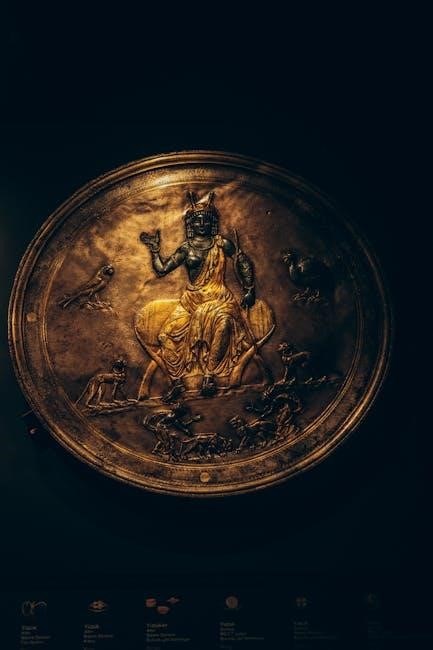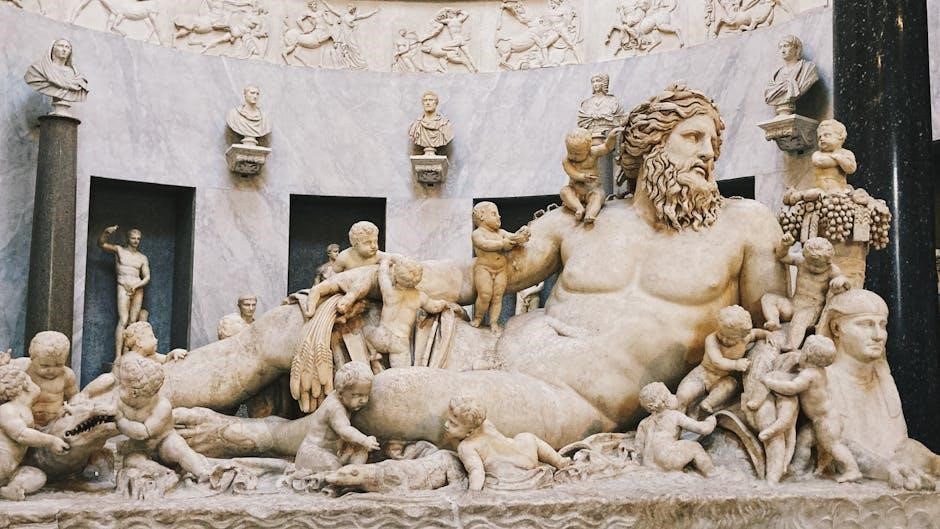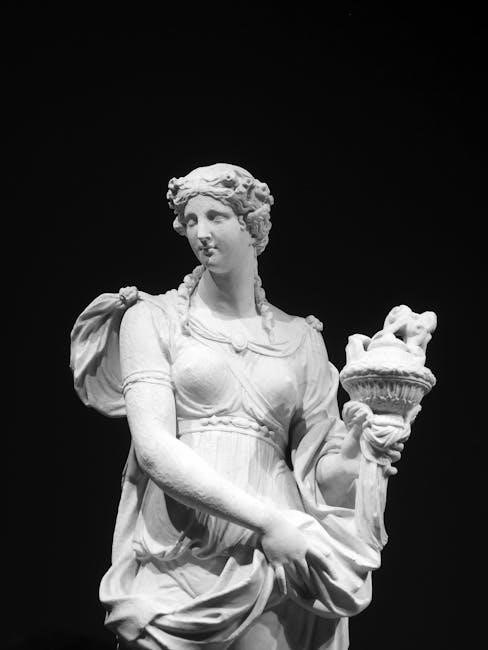
Classical mythology explores ancient stories, themes, and beliefs, preserved through texts like the Anthology of Classical Myth, offering insights into cultural heritage and human imagination.
Overview of Classical Mythology
Classical mythology encompasses the stories, gods, and legends of ancient Greek and Roman cultures, offering insights into their beliefs, values, and cultural identity. These narratives, often centered on divine and heroic figures, explore themes of human nature, morality, and the universe. The Anthology of Classical Myth provides a comprehensive collection of primary sources, including Near Eastern texts like the Epic of Gilgamesh and Enuma Elish, alongside Greek and Roman myths. These stories, passed down through generations, reveal the shared cultural heritage of the Mediterranean world and continue to influence art, literature, and thought today. The anthology serves as a vital resource for understanding these timeless tales.
Significance of Primary Sources in Translation
Primary sources in translation, such as those in the Anthology of Classical Myth, provide direct access to original texts, enabling readers to engage with ancient narratives in modern languages. These translations preserve the essence of myths from Greek, Roman, and Near Eastern traditions, allowing for a deeper understanding of cultural and historical contexts. By making these sources accessible, the anthology bridges the gap between antiquity and contemporary readers, fostering academic study and personal enrichment. This approach ensures that the rich diversity of mythological themes remains relevant and understandable for a broad audience today.
Key Features of the Anthology
The anthology offers a comprehensive collection of primary sources, including Near Eastern texts like Gilgamesh and Enuma Elish, organized for clarity and accessibility in PDF format.
Inclusion of Near Eastern Texts
The anthology incorporates essential Near Eastern texts, such as the Babylonian Epic of Gilgamesh, Enuma Elish, and Atrahasis, alongside the Hittite Song of Emergence. These selections highlight cultural and thematic parallels between ancient Greek and Mesopotamian mythologies, enriching the study of classical myth. By including these works, the anthology bridges gaps between civilizations, offering a broader perspective on shared mythological motifs. This inclusion enhances its academic value, making it a vital resource for understanding the evolution and interconnectedness of mythological narratives across the ancient world. It underscores the anthology’s commitment to providing a comprehensive and comparative approach to classical mythology.
Structure and Organization of the Anthology
The anthology is meticulously organized to provide a logical flow of mythological narratives. It begins with an introduction to the study of classical mythology, followed by primary sources from ancient Greek, Roman, and Near Eastern traditions. The texts are divided into thematic sections, such as creation myths, heroic tales, and divine narratives, ensuring ease of navigation. The inclusion of a preface, acknowledgments, and a note to students further enhances its accessibility. The anthology concludes with a comprehensive bibliography and index, making it a well-rounded resource for both academic and personal exploration of classical mythology. This structure ensures a cohesive and engaging reading experience.
Translation Quality and Accessibility

The anthology excels in presenting high-quality translations that maintain the original texts’ integrity while ensuring accessibility for modern readers. The translations are rendered in clear, modern English, making complex ancient narratives understandable without losing their poetic essence. This balance between fidelity and readability is a hallmark of the anthology. Additionally, the availability of the text in formats such as PDF and eBook enhances its accessibility, allowing students and scholars to engage with the material across various platforms. This ensures that the anthology remains a valuable resource for both academic and personal study of classical mythology.
Academic and Educational Significance

The anthology serves as a vital academic resource, aiding curriculum design and enhancing understanding of mythological themes, making it indispensable for scholars and students of classical studies.
Role in Curriculum Design
The Anthology of Classical Myth is a cornerstone in curriculum design for classical studies, providing primary sources that align with course objectives. It offers a structured approach to teaching mythology, enabling educators to integrate diverse texts such as the Babylonian Epic of Gilgamesh and Enuma Elish seamlessly into syllabi. The inclusion of Near Eastern texts alongside Greek and Roman myths fosters comparative analysis, enriching students’ understanding of cultural influences and thematic parallels. This comprehensive resource supports interdisciplinary learning, making it an essential tool for designing engaging and informative courses in mythology and ancient civilizations.
Enhancing Understanding of Mythological Themes
The Anthology of Classical Myth enhances understanding of mythological themes by providing direct access to primary sources like the Babylonian Epic of Gilgamesh and Enuma Elish. These texts allow students to explore universal motifs such as heroism, creation, and the struggle between chaos and order. By comparing Near Eastern and Greek myths, readers gain insights into cultural influences and shared human experiences. The anthology’s modern translations make complex themes accessible, fostering deeper engagement with mythological narratives and their enduring relevance in literature and art. This resource bridges ancient and modern perspectives, enriching the study of mythology.

Primary Sources and Their Relevance
The Anthology of Classical Myth includes primary sources like the Babylonian Epic of Gilgamesh and Enuma Elish, offering original narratives that shape cultural and mythological understanding.

The Babylonian Epic of Gilgamesh
The Babylonian Epic of Gilgamesh, included in the anthology, is one of humanity’s earliest literary masterpieces. It explores themes of friendship, mortality, and the quest for immortality through Gilgamesh’s adventures. This epic not only influences ancient Mesopotamian culture but also resonates with Greek mythology, highlighting universal human concerns. The anthology’s modern English translation makes this ancient text accessible, allowing students to connect with its timeless themes and appreciate its historical significance in shaping classical mythological narratives.
Epic of Creation (Enuma Elish)
The Epic of Creation, or Enuma Elish, is a foundational Babylonian myth detailing the origins of the world and the rise of the god Marduk. This ancient text, included in the anthology, describes the primordial gods emerging from chaos and the eventual creation of humanity. The epic highlights themes of divine conflict, order, and the establishment of cosmic hierarchy. Its inclusion in the anthology provides a crucial link between Near Eastern and Greek mythologies, showcasing shared motifs and cultural influences. The translation in the anthology makes this seminal work accessible, offering insights into the evolution of creation myths and their enduring relevance.
The Hittite Song of Emergence
The Hittite Song of Emergence is an ancient hymn that narrates the ascent of the Hittite storm god Tessub into divine kingship. This text, featured in the anthology, offers a unique glimpse into Hittite religious practices and cosmology. It explores themes of divine authority, ritual, and the establishment of cosmic order. The inclusion of this song in the anthology bridges the gap between Hittite and other Near Eastern mythologies, providing a comparative perspective. The translation enhances accessibility, allowing readers to appreciate the cultural and theological significance of this lesser-known but important Hittite text within the broader context of classical mythology.

Modern Editions and Accessibility
The second edition of the Anthology of Classical Myth is available in PDF format, enhancing accessibility for students and scholars. Published by Hackett, it features primary sources in translation, ensuring modern readers can engage with ancient texts effortlessly.
Second Edition Enhancements
The second edition of the Anthology of Classical Myth introduces enhanced features, including additional primary sources such as the Babylonian Epic of Gilgamesh and Enuma Elish. Improved translations ensure clarity and accessibility for modern readers. The inclusion of Near Eastern texts fosters a broader understanding of mythological influences. The PDF format allows for easy digital access, making it a valuable resource for both academic and personal study. These enhancements reflect a commitment to providing a comprehensive and user-friendly collection of classical myths, bridging ancient narratives with contemporary learning needs.
Availability in PDF Format
The Anthology of Classical Myth is readily available in PDF format, offering readers convenient access to its comprehensive collection of primary sources. This digital version ensures portability and ease of use, making it ideal for students and scholars. The PDF format preserves the original structure and content, including translations and annotations, while allowing for efficient searching and referencing. Its availability on platforms like ebookultra.com and Hackett Publishing ensures widespread accessibility, making classical mythology more approachable for modern audiences seeking to explore ancient narratives in a flexible and user-friendly manner.


Reception and Reviews
The Anthology of Classical Myth has garnered praise for its accessible translations and comprehensive coverage of primary sources, enhancing its reputation as a valuable educational resource.
Scholarly Feedback and Endorsements
The Anthology of Classical Myth has received widespread scholarly acclaim for its meticulous translations and comprehensive inclusion of Near Eastern texts, such as the Epic of Gilgamesh and Enuma Elish. Academics praise its ability to bridge Greek and Mesopotamian mythologies, offering students a broader cultural context. The second edition’s enhanced structure and improved readability have further solidified its reputation as an essential resource for classical studies. Educators and researchers alike endorse it for its accessibility and depth, making it a cornerstone in both undergraduate and graduate curricula focused on ancient mythological traditions.

Student and Reader Responses
Students and readers have praised the Anthology of Classical Myth for its accessibility and engaging presentation of primary sources. The inclusion of Near Eastern texts, such as the Epic of Gilgamesh, has been particularly appreciated for its ability to foster comparative analysis. Many highlight the clarity of translations, which make ancient myths relatable to modern audiences. The availability of the anthology in PDF format has also been commended for its convenience, allowing easy access for study and research. Overall, the anthology is widely regarded as an invaluable resource for understanding mythological themes and their cultural significance.